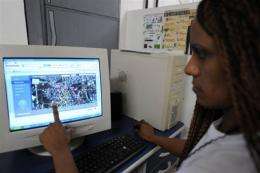Rio youth use GPS phones to put favelas on map

Rio's favelas are home to a third of the city's population, but are almost invisible on maps -- a situation five young women are trying to change with the help of GPS and the Internet.
Rafaela Goncalves da Silva, 21, has lived in the Santa Marta favela, a poor and dangerous slum that was recently the target of a police pacification operation, since she was two years old.
She is bringing up her son there now, and takes him to school each day by cable-car under the watchful gaze of the Christ the Redeemer statue that dominates the city's horizon.
She is also among the five women recruited by youth organization Rede Jovem to use GPS-equipped cellphones to map and log the streets of Rio's favelas.
"I start up the GPS at the beginning of the street, then I walk without stopping until the end," she told AFP. The information is then uploaded to the Wikimapa site, where is available for anyone to access.
Some of the streets being mapped do not have an official name.
"I just ask the older residents what they call, the community calls the street," she said, tapping in one such name -- Paciencia Street -- into her cellphone.
The mapping project goes beyond just street names, and includes details of local shops, clubs and meeting points.
On this street, Rafaela's first stop is at Flavio's, "whose fatty cakes are bad for your heart," she said, sitting on the sidewalk. She takes down the name of the shop, a little background, opening hours and a photograph. Within minutes, the information is available on the online map.
There is plenty more for Rafaela to document -- football fields, cybercafes, shops, churches. She takes photographs and videos, and little escapes her telephone. She even captures the location where Michael Jackson filmed the video for his song "They don't really care about us," in 1996.
"People are often suspicious, but I explain that I'm doing this for an Internet project and that reassures them," she said.
Rafaela is one of five so-called "wikireporters" recruited by Rede Jovem.
"We looked for dynamic young people from poor neighborhoods who wanted to learn," said Natalia Santos, a Rede Jovem representative.
The five young women, chosen because they are "less timid than boys", will compete to see who can obtain the most information over the next six months. The winner will receive a grant to study journalism, but for now each of the five receives a monthly stipend of 105 dollars along with a GPS cellphone.
Rede Jovem works to try and drive social engagement among underprivileged youth by facilitating their access to new information and communication technologies. The group points out that Wikimapa can serve as a way to encourage Internet use.
"Everyone can participate and send their information," Santos said. "All you need is a 3G telephone with GPS and to upload the Wikimapa software. We're hoping to map all of Brazil."
In many favelas, wi-fi access is free, and more and more residents have Internet access.
For Alini dos Santos Silva, a wikireporter from Pavao-Pavaozinho in the heights of Copacabana, the project is also a chance to refute the "big lies" she says are told about the slums, many of which are run by drug traffickers and gangs.
"People think that there's nothing here but violence. But I want to show them! The favelas are above all places of life, of meetings," she said.
(c) 2009 AFP



















